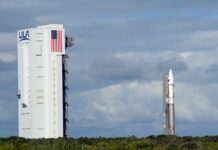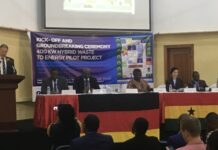
The West African Science Service Centre on Climate Change and Adapted Land Use, WASCAL, in collaboration with National Aeronautics and Space Administration (NASA) and the University of Missouri – Kansas City, have organized a 12-day Capacity Building Workshop on Interdisciplinary Remote Sensing, Modeling, and Validation of Environmental Processes.
Dr. Charles Ichoku from NASA Goddard Space Flight Centre, expressed his delight about the workshop and assured participants that the outcome of the workshop was going to contribute immensely towards West African development.
Pro-Vice Chancellor, Kwame Nkrumah University Science and Technology (KNUST), Rev. Professor Charles Ansah, in his welcome address expressed the excitement of the University Management about the introduction of the WASCAL PhD programme in Climate Change and Land Use funded by the Federal Ministry of Education and Research (BMBF), Germany.
He noted that NASA-COSPAR (Committee on Space and Research) training workshop was very useful to train the next generation of scientists, enhance their knowledge and stimulate research interests in space science. Rev. Prof. Ansah stated.
“As a University, we welcome the initiative by the German Government, NASA, COSPAR and the University of Missouri – Kansas City to support the training of Africans to solve Africa’s challenges especially on issues relating to Climate Science, with particular focus on Remote Sensing Climate Modeling”. He stated.
Professor Janet Adelegan, Director for Capacity Building, WASCAL, traced the history of the WASCAL-NASA collaboration and briefly explained that the workshop is aimed at building the capacity of early career scientists on remote sensing and modelling of climate data in West Africa.
This workshop, primarily sponsored by the International Committee on Space Research (COSPAR) and WASCAL, with supplementary funding support from African Development Bank (AfDB), aimed at equipping students with knowledge in space-based interdisciplinary remote sensing and modelling, which is in its infancy in West Africa. Over all, nine lecturers from NASA and other Institutions in Europe and West Africa, and thirty early career scientists from WASCAL Doctoral Schools in West Africa, postgraduate students and academic faculty participated in the workshop.
WASCAL is a large-scale research-focused Climate Service Centre designed to help tackle severe challenges posed by climate change and thereby enhance the resilience of human and environmental systems to climate change and increased variability. It does so by strengthening the research infrastructure and capacity in West Africa related to climate change and by pooling the expertise of ten West African countries and Germany. The WASCAL Capacity Building Programme through the Graduate studies programme helps to educate the next generation of scientists in West Africa to attain an intimate knowledge of different climate related issues in order to help the region develop suitable management strategies. WASCAL’s graduate studies programmes (GRPs) are implemented in ten leading Universities across nine West African countries.




